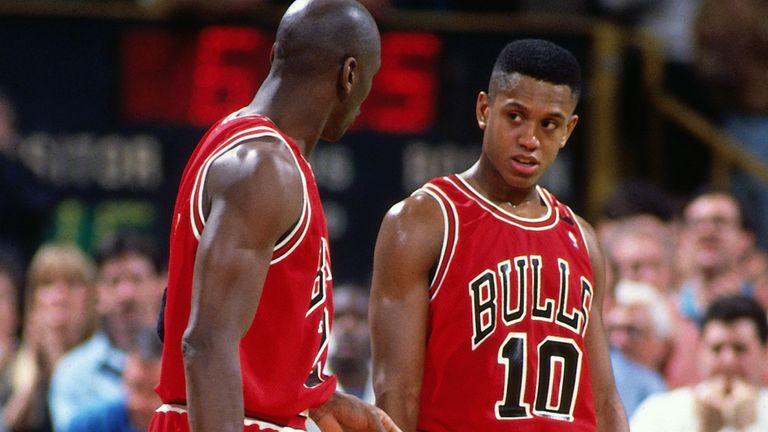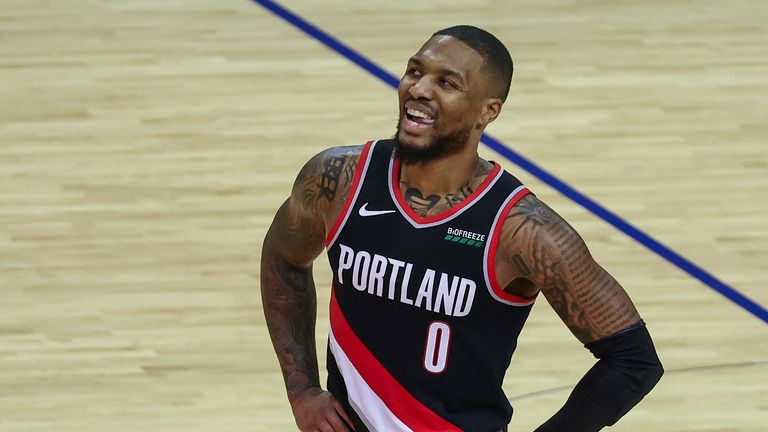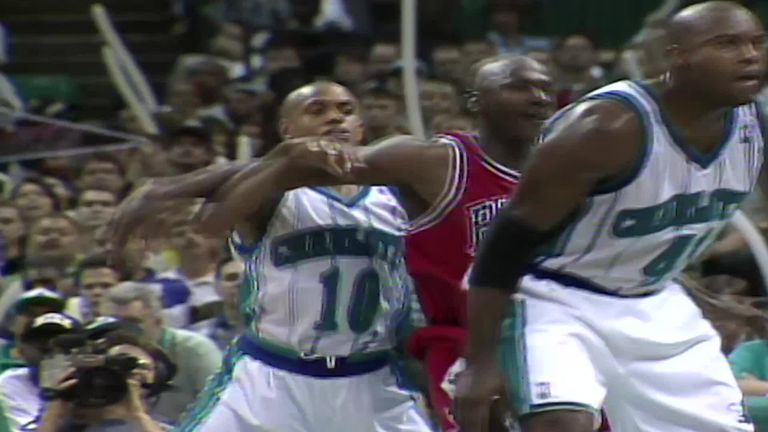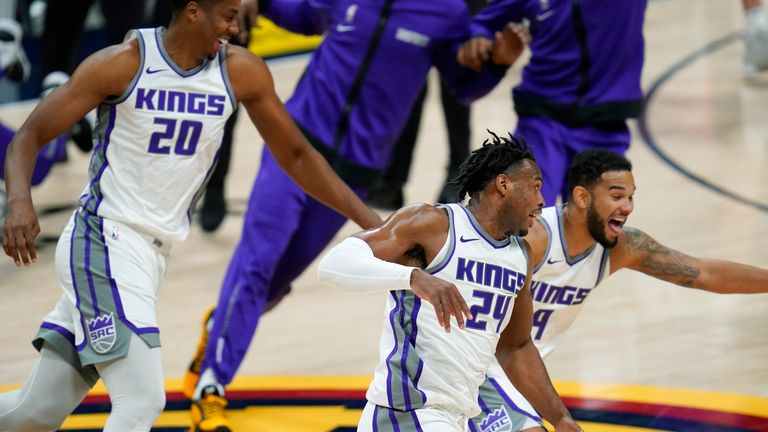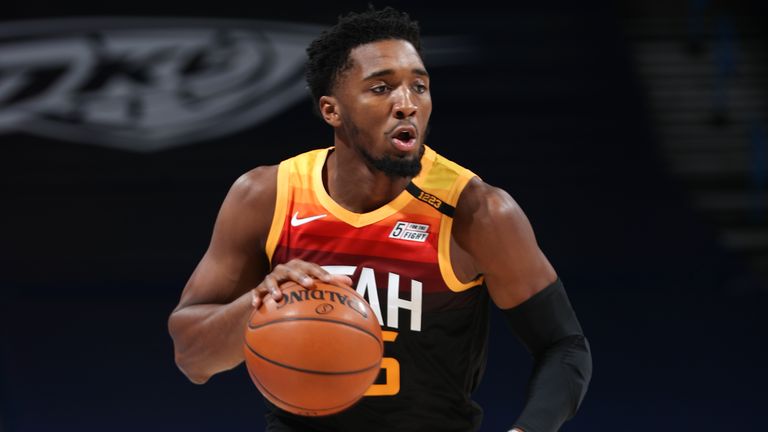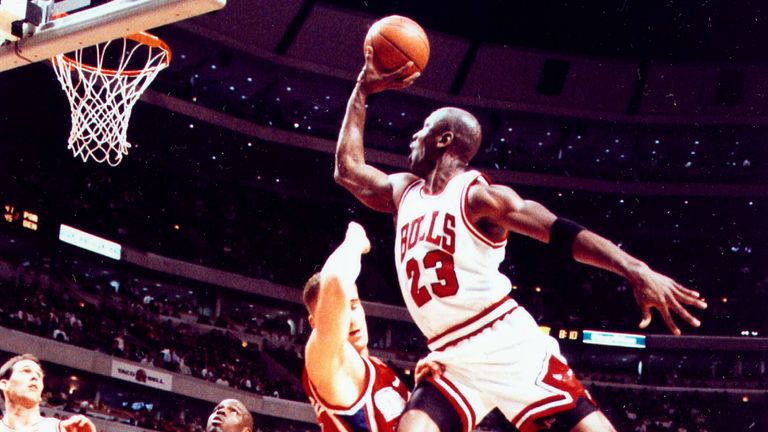B.J. Armstrong on Michael Jordan and the art of game-winners: 'He had the shortest memory of anyone I've seen'
Coverage of the NBA continues on Sunday evening as the Boston Celtics take on the Washington Wizards at 6pm, with analysis from B.J. Armstrong, live on Sky Sports Arena
Sunday 14 February 2021 16:29, UK
"As a young player you always have this fantasy of hitting the game-winner. Whether you're out in the driveway, or in the park playing or in the gym. It’s always that fantasy of 3,2,1… you get the ball and you become the hero. "
Already this season we have been treated to game-winning shots from the likes of Tobias Harris, Jayson Tatum, Zach LaVine and Donovan Mitchell; as well as dramatic buzzer-beaters to flip the result at the death from Cole Anthony, Buddy Hield and - of course - Damian Lillard.
Every player at every level from the high school gym to the NBA has likely wondered what it must feel like to hit such a shot, a comic book hero fading three-pointer with the game on the line. If you miss, you lose, if you make it, you win. Death or glory. History or anonymity.
One man who knows all about late-game pressure and stepping up in moments that can tilt the entire momentum of a game, or even a series, is NBA All-Star and Heatcheck analyst B.J. Armstrong.
He even did so against Michael Jordan and the Chicago Bulls, the team with which he made his name, having won three straight titles under Phil Jackson between 1991 and 1993.
Trending
- World Darts Championship final LIVE! Reaction as Littler stuns MVG to win title
- Transfer Centre LIVE! Trent, Rashford, Olmo latest
- Littler crushes MVG to become youngest World Darts champion
- 'Majestic stuff from the Nuke!' | Littler hits 11-dart leg to break MVG
- 'What a slap in the face for MVG!' | Littler hits bull for 70!
- Liverpool latest: What do Salah's latest comments mean?
- PL Predictions: Expect the unexpected...Man Utd to win at Anfield?
- Littler pins effortless 124 on the bull!
- Darts in 2025: Key dates for main PDC events
- Salah wants 'special' Premier League win in 'last year' at Liverpool
But three years removed from leaving the Bulls, Armstrong took over for the Charlotte Hornets in the 1998 Eastern Conference semi-finals and hit a game-winning pull-up jumper from midrange after leaving his defender - none other than Michael Jordan - stuck on a screen.
The shot gave the Hornets a five-point lead with just 18 seconds remaining, icing the second match of the series.
Had he missed, it would have likely been a one possession game and Chicago's ball - never a situation you want to be in against a team boasting Jordan, let alone Scottie Pippen, Toni Kukoc and Steve Kerr.
Let's just say that Jordan took that personally (as he did for everything throughout the entirety of The Last Dance).
The series didn't end well for the Hornets as they went down 4-1 to the eventual champions, with Michael scoring 27, 31 and then 33 in the three games that followed.
For Armstrong, the chance to take the last shot is the true test of every NBA player for one simple reason: it reveals who they really are.
"It's about having the will to say, 'You know what, I'm going to live with the results,'" he said.
"For a lot of players it's easy when things are going well. But you find out a lot about someone or a team when things aren't going well. Before you start making those shots you have to become comfortable with dealing with those failures. It's just a good life lesson dealing with that.
"I've missed those shots more often than I've made them. But I've always been comfortable taking those shots, I was comfortable living with those results, I was comfortable that I could face the music.
"That to me was really telling about myself. That I could put myself in that situation. When they don't make them I always think, 'Ok, is that person capable of dealing with that?'
"It's not what you do when times are good, it's what you do when times are bad. That's how you find out the true character of a person or a team."
As for Jordan, Armstrong believes that his unmatched track record in the clutch was down to his short memory. Or in other words, the ability to treat the next shot the same no matter the result of the one before.
"There's Michael and then there's the rest of us," he explained.
"Michael just didn't have a memory. He had the shortest memory of anyone I've ever seen. Whether he made the shot or missed the shot he had already moved on to the next play. He had an amazing capacity to just be in the moment.
"I always used to joke with him, 'Do you even remember what you did yesterday?' He always used to say, 'B.J. the score is still 0-0'. That was always his thing. He just stayed neutral to every situation and it was a great quality to have and one that I just picked up over the years playing alongside him.
"He's a very unique personality, unlike anyone I've seen. And that's because he only really had one goal and that was to win. He wasn't very complex. He didn't play because he wanted glory. He didn't play because he wanted to be the greatest player. He didn't play because he wanted to be the hero. He didn't play because he wanted to score the most points.
"He just wanted to win. All the other things really didn't matter to him."
